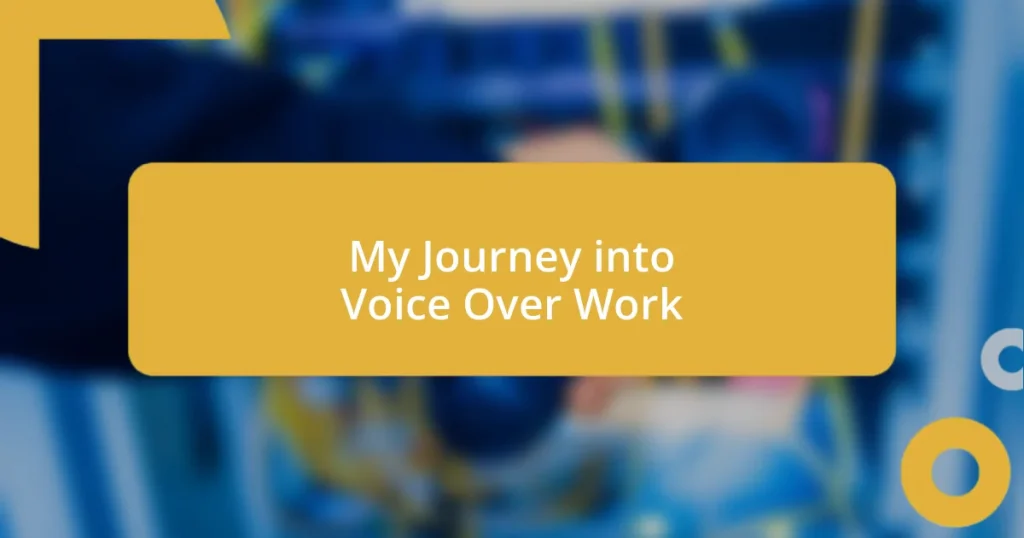Key takeaways:
- Voice acting requires emotional immersion and the ability to prioritize self-care amidst a busy schedule of auditions and personal commitments.
- Setting realistic goals and establishing a dedicated workspace enhances productivity and creative focus, allowing for better performance and progression in the craft.
- Incorporating breaks and regularly evaluating progress are essential for maintaining mental health and recognizing growth in voice acting abilities.
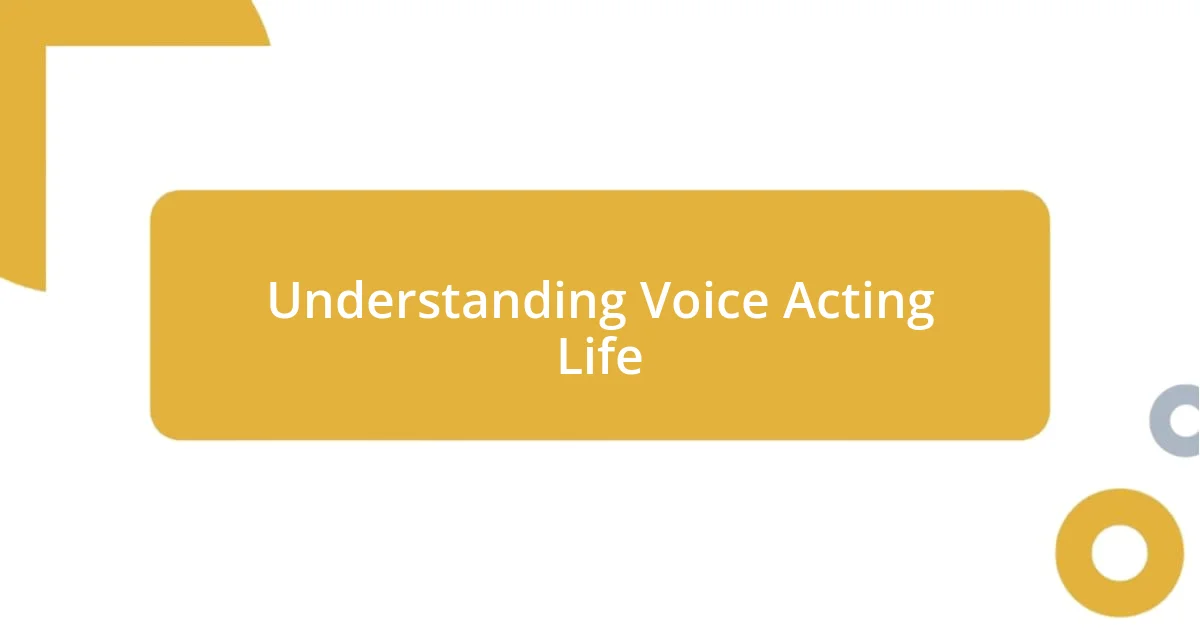
Understanding Voice Acting Life
Voice acting is more than just lending your voice to a character; it’s about immersing yourself into the mindset of that character. I recall my first big role, feeling a whirlwind of emotions as I transformed my voice and persona to match the script. Have you ever felt that rush of adrenaline when you know you’ve nailed a performance? It’s a unique blend of pressure and excitement that fuels my passion.
Navigating the voice acting world often means juggling multiple projects, deadlines, and personal commitments. I remember one particularly hectic week where I had three auditions, a recording session, and a family event all looming over me. How do you find balance in such chaos? It comes down to prioritizing what truly matters and recognizing that self-care is not a luxury but a necessity.
The connections you build with other voice actors and industry professionals are invaluable. I cherish the late-night chats with fellow artists who share their triumphs and struggles, creating a network of support. Isn’t it comforting to know that we’re all learning from each other’s experiences? This camaraderie enriches the voice acting life, reminding us we’re part of a larger community, even when we may feel isolated in our sound booths.
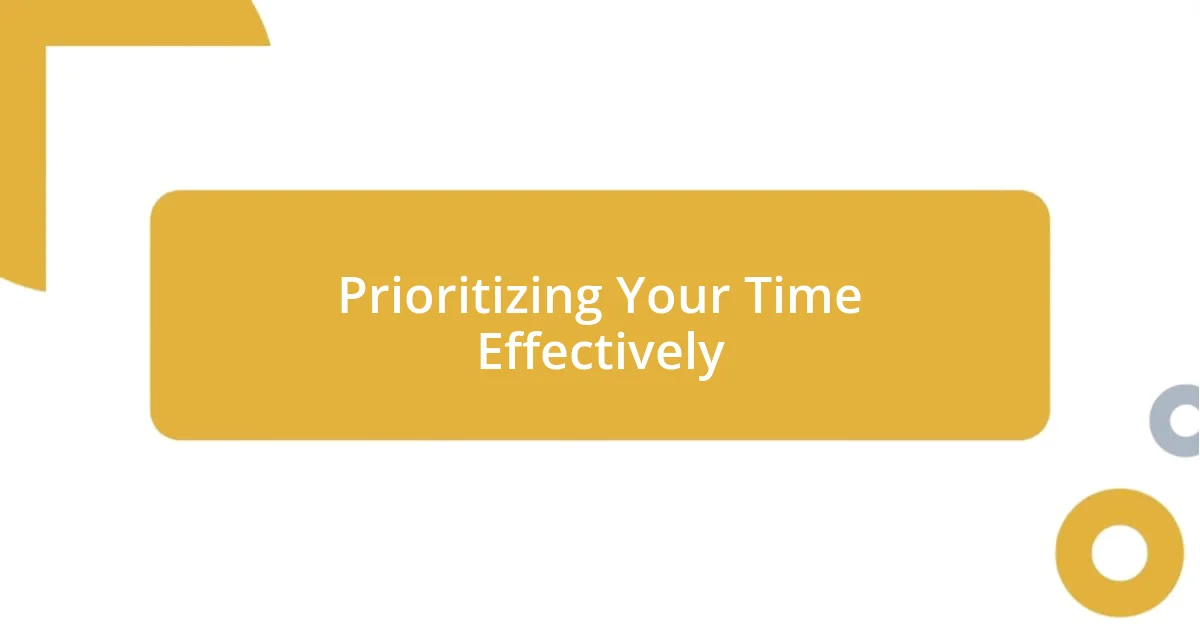
Prioritizing Your Time Effectively
Prioritizing your time effectively is crucial, especially when juggling voice acting with life’s demands. I’ve learned that setting clear goals for the week helps me focus. For example, on Sundays, I allocate an hour to plan my upcoming projects and auditions. This practice not only keeps me organized but also eases my anxiety as I know what to expect.
I’ve found that differentiating between urgent and important tasks is a game changer. For instance, when I was preparing for a significant audition, I realized that some social events could wait. It was difficult to decline invitations from friends, but I reminded myself that investing time in my passion would ultimately benefit my relationships in the long run. By prioritizing my voice acting work, I felt a sense of accomplishment that nourished my personal connections.
Creating a schedule that incorporates breaks is essential too. I often block out time for short walks or meditation which recharge my creative energy. It’s fascinating how stepping away from the mic can lead to breakthroughs in performance. This balance of work and rest not only boosts my productivity but also keeps my passion for voice acting alive.
| Task Type | Action Steps |
|---|---|
| Urgent | Complete auditions and recordings. |
| Important | Plan future roles and networking opportunities. |
| Personal | Dedicate time for family and self-care. |
| Flexibility | Adjust tasks based on energy levels. |
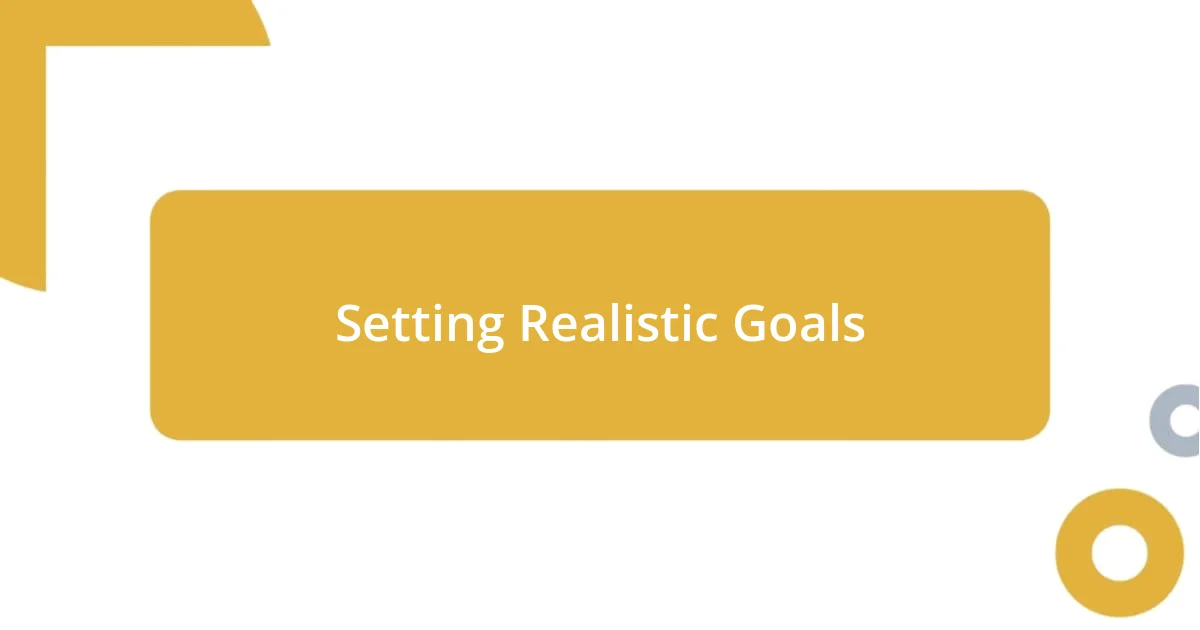
Setting Realistic Goals
Setting realistic goals is the cornerstone of balancing voice acting with life’s other demands. I’ve often found myself overwhelmed with ambitions, believing I could conquer every project that came my way. However, I quickly learned that setting attainable goals, like committing to a certain number of auditions or dedicating specific hours to practice each week, made a world of difference. When I completed these goals, the sense of achievement felt like a gentle affirmation that I was on the right track.
Here are some key considerations for setting realistic goals:
– Assess Your Current Commitments: Understand what you can realistically take on without compromising your well-being.
– Break It Down: Divide larger tasks into smaller, manageable objectives that build momentum.
– Stay Flexible: Life is unpredictable, so adjust your goals based on how your week unfolds.
– Celebrate Small Wins: Acknowledge every milestone, no matter how small; this boosts motivation and keeps the momentum going.
I remember a particular time when I aimed to secure three voice acting roles in a month. Instead, I aimed for one well-prepared audition each week, which made the whole process enjoyable rather than stressful. In time, I landed that one role, and the sense of satisfaction was worth every calculated step. By aligning my ambitions with reality, I found joy in the journey, ultimately leading to more opportunities than I initially expected.
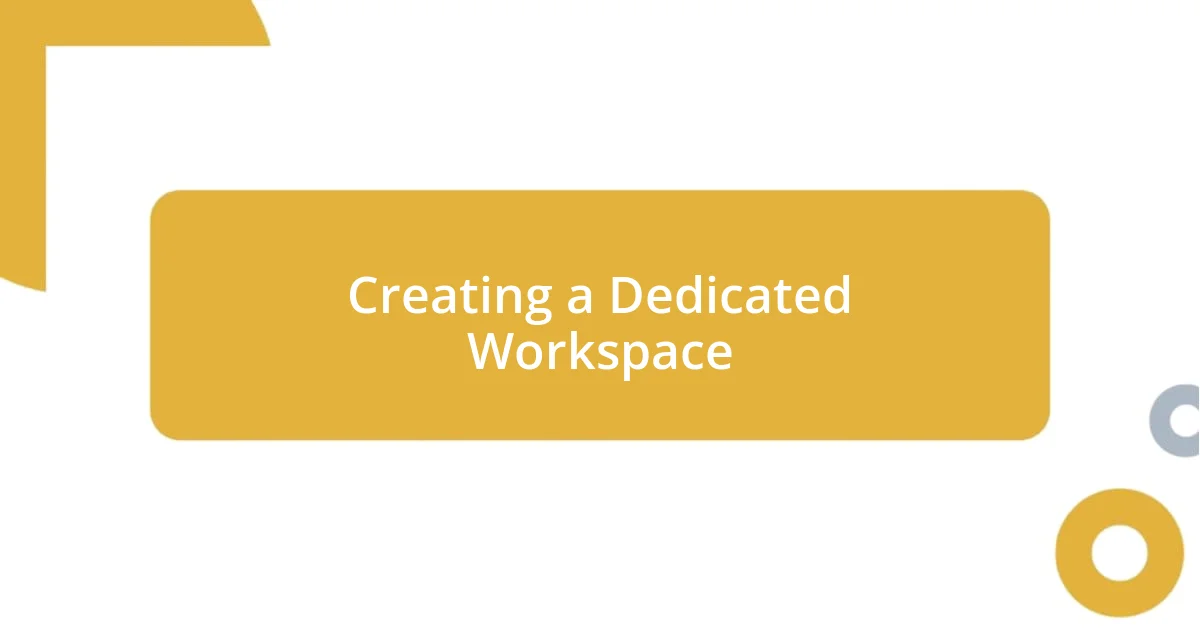
Creating a Dedicated Workspace
Creating a dedicated workspace is one of the most impactful steps I took to enhance my voice acting journey. When I established a specific corner in my home solely for recording, it transformed my mindset. This area became a personal oasis where I could delve into characters and script readings without distractions. Have you ever noticed how the right environment can influence your performance? It’s incredible!
I personally invested time in soundproofing my space, cushioning it with soft furnishings and curtains. This not only muffled unwanted noise but also created a cozy atmosphere that made me feel at ease. I recall the first time I stepped into that space and did a read-through; the ambiance seemed to envelop me, allowing my voice to connect with every line more deeply than ever before. Isn’t it amazing how a little thoughtfulness in your environment can lead to memorable performances?
Moreover, keeping my workspace organized plays a crucial role. I like to have all my scripts, notes, and tools within arm’s reach, which minimizes unnecessary movements and keeps my momentum flowing. I can still remember fumbling through piles of papers during an important session; it was chaotic! Now, everything is neatly labeled and stored, which not only saves time but also reduces the stress of searching for materials. Isn’t it liberating when you can focus entirely on your craft without distractions?
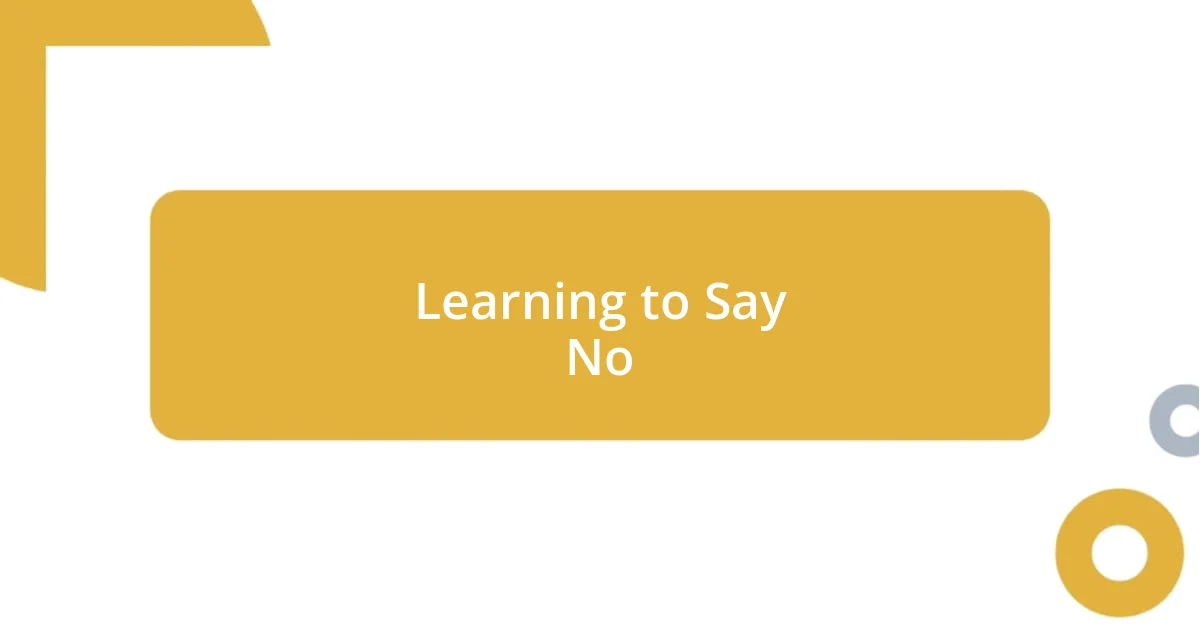
Learning to Say No
Learning to say no is a skill I’ve had to cultivate over the years. I remember a period when my calendar was crammed with auditions, workshops, and social gatherings. It felt almost heroic to say yes to everything, but the toll on my mental health was immense. Once, I agreed to a late-night recording session after a long day, leaving me drained and underprepared for the next day’s commitments. It was a wake-up call—I realized that my well-being should always take precedence.
What struck me was how liberating it felt to start setting boundaries. I learned that saying no doesn’t make me a flake; it simply means I’m prioritizing my energy and focus. One time, I turned down an opportunity that seemed enticing but would have taken me away from my daily practice. In hindsight, that was one of the best decisions I made. Focusing on fewer projects allowed me to dive deeper into my craft, and I found myself improving much more quickly than I had when I was juggling everything.
I still occasionally struggle with saying no, especially when I see friends and colleagues pulling off impressive feats. However, I’ve embraced the idea that my journey might look different, and that’s perfectly okay. What’s crucial is that I guard my time fiercely. Instead of feeling guilty, I now see it as an investment in my future self. Isn’t it interesting how one little word can reshape your entire approach to life and work?
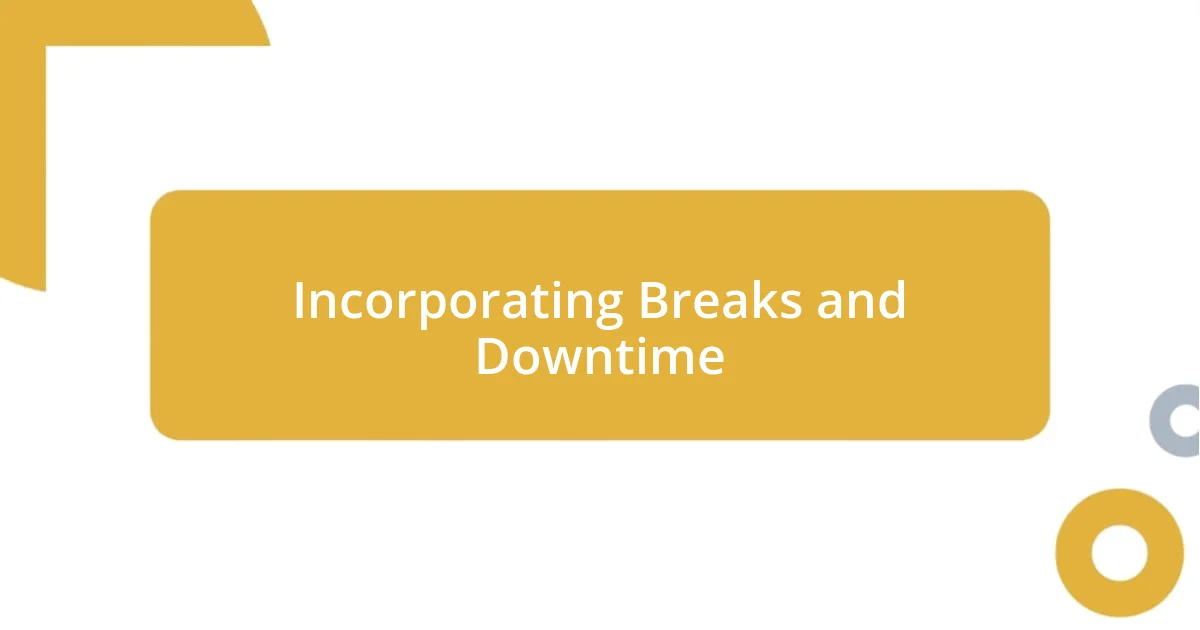
Incorporating Breaks and Downtime
Incorporating breaks and downtime is something I’ve learned to prioritize amidst my hectic voice acting schedule. There was a time when I thought I had to push through every session without pause, convinced that longer hours equated to better productivity. I soon discovered that stepping away, even just for a few minutes, rejuvenates my energy and sharpens my focus. Have you ever noticed how a short walk or a few deep breaths can refresh your mind? It truly makes a difference.
I’ve developed a routine of taking intentional breaks between recordings—about 10 to 15 minutes. During these moments, I might stretch or enjoy a cup of tea, allowing my body and voice to reset. I still remember a recording session that dragged on too long; my voice was strained, and I felt mentally foggy. After that experience, I committed to regularly incorporating downtime, and it has transformed not just my vocal quality but my entire mindset. Doesn’t it feel good to come back stronger and more present?
Listening to my body has also become crucial in recognizing when to take a step back. On days when I feel particularly drained, I allow myself to take longer breaks or even a full day off if needed. The relief in granting myself permission to rest is unparalleled. Reflecting on my early days, I see how the pressure I put on myself led to burnout. Now, I appreciate that downtime isn’t a luxury—it’s essential. How has taking breaks influenced your own work-life balance?
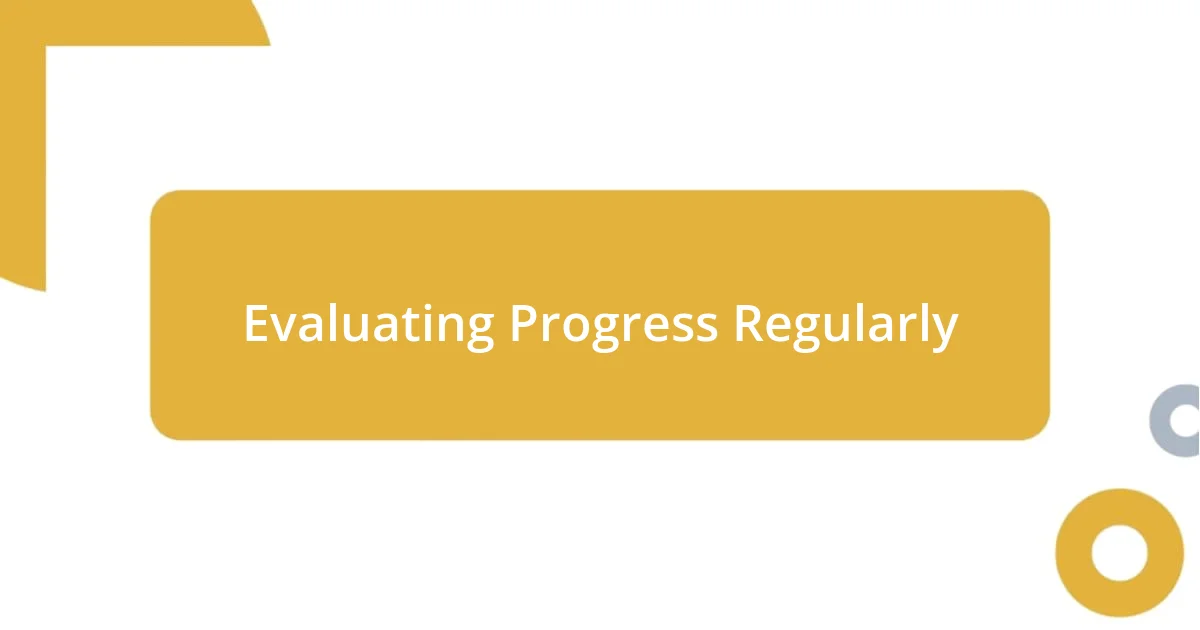
Evaluating Progress Regularly
Evaluating progress regularly is something I’ve come to see as a vital part of my voice acting journey. Looking back, there were times I would get so caught up in auditions and performances that I forgot to pause and reflect on my growth. For instance, after a series of roles, I took a weekend to review my recordings, and it hit me how much my technique had evolved—I noticed previously overlooked voice modulation skills that had become second nature. Have you ever experienced that moment of clarity when you realize just how far you’ve come?
The process isn’t just about assessing vocal improvements; it’s also about understanding my emotional and psychological growth. I used to shy away from constructive criticism, but now I actively seek feedback from peers and mentors. One recent session, a mentor pointed out some subtle spots where my emotional delivery could be sharper. At first, I felt a bit defensive, but as I sat with the feedback, I recognized it as an opportunity for deeper expression. I’ve learned that embracing constructive critique fuels my progress, don’t you think?
Incorporating regular evaluations has also helped me set realistic goals. I remember setting an ambitious target of landing a certain number of roles within a year, but as I tracked my applications and auditions, I realized my focus needed to be on quality rather than quantity. This shift sparked a new determination in me; it’s about aligning my aspirations with my capabilities. As I reflect on my achievements, I am filled with gratitude for each step, and it reinforces the importance of this practice. How do you keep yourself accountable and motivated on your own path?















